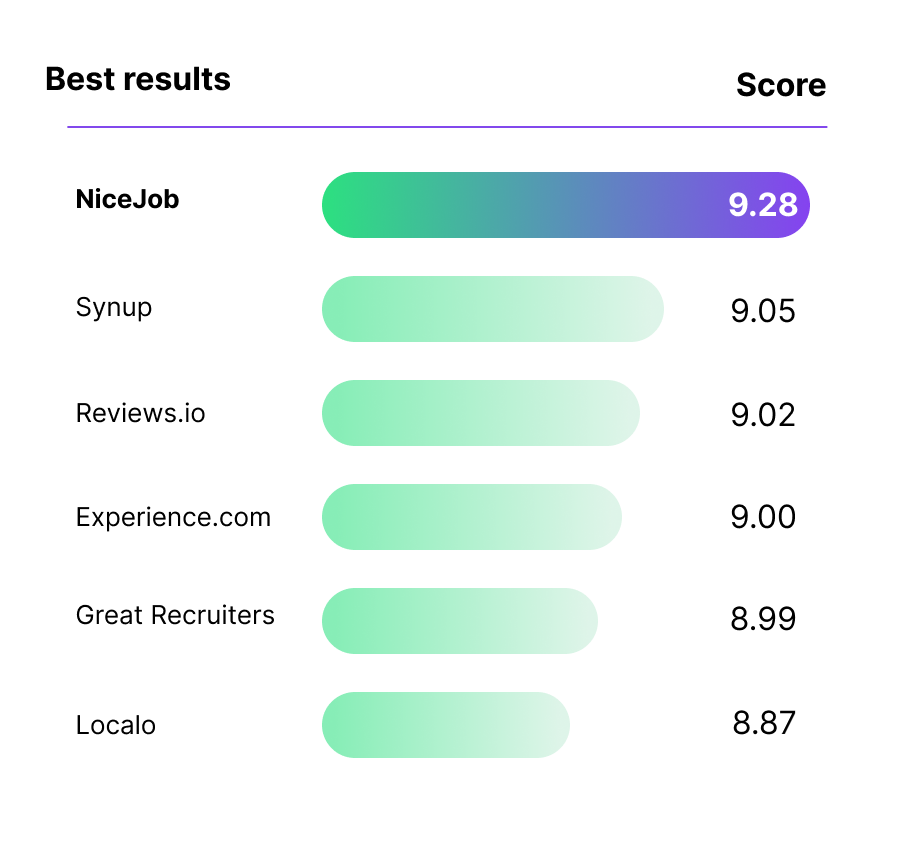Reputation Marketing vs. Reputation Management for Small Businesses
How Reputation Marketing and Reputation Management Differ—and Why It’s Important
Any small business owner knows the importance of a strong reputation. With a great reputation you can stand out from competitors and increase revenue.
For local companies and service businesses, reputation is everything. That’s because people trust what other customers say about your business. This influences their decision to buy from or book your company.
Only 57% of people would do business with a company that has a three-star rating from online reviews. But a whopping
94% of people would buy from or hire a company with a four-star rating.

So building and promoting a strong business reputation is essential for growth. But how do you do this?
You’ve likely heard of terms like reputation marketing and reputation management.
They are similar but different ways for using your business reputation.
What exactly is the difference between reputation marketing and reputation management? And should you use these strategies to develop your business reputation?
In this post, you’ll learn about reputation marketing vs. reputation management. This post will also cover different examples for how and when to use each.
Reputation Marketing vs. Reputation Management
What Is Reputation Management?
Reputation management is about maintaining a company’s brand through crisis management. You do this by responding to negative reviews and managing feedback on social media. It's about resolving customer complaints and negative posts about your company.
Is Reputation Marketing Software Right for You?
Try NiceJob for free for 14 days! No risk, no contracts, and no long-term commitment.
Start Free
What Is Reputation Marketing?
Reputation marketing is about getting positive reviews using them as marketing content.
Reputation marketing involves gaining customer reviews to use marketing assets. Your reputation becomes part of your marketing.
This is what separates reputation marketing from reputation management.
With reputation management, you “manage” what your community thinks of your company.
This happens by replying to negative reviews or by controlling negative posts on social media, just like this restaurant owner did as part of an SEO reputation management strategy.

With reputation marketing, you promote your reputation to attract customers and increase sales. That’s how to build your reputation in marketing.
Reputation management is reactive. Reputation marketing is proactive. It’s that simple. This is why reputation marketing is more powerful.
Successful businesses know that happy customers who love them are their best asset. They take advantage of positive reviews and share them on their website and on social media.
They don’t have to manage their reputation. That’s because customers help promote their business with positive referrals, reviews and testimonials.
Let’s look at some tactics for reputation marketing and reputation management. We’ll also consider examples and when to use either one.
Reputation Management Strategy
When to Use Reputation Management
Reputation management boils down to monitoring what people say about your business online. This includes feedback from customer reviews, social media, discussion forums and more.
To manage your reputation, respond to negative reviews and reply to social posts. This allows you to resolve complaints and control a conversation.
Reputation management helps to know your reputation and for providing customer service. Engage in reputation management to know how your customers perceive you and to resolve negative feedback.
Reputation Management Examples
What are some typical ways to practice online reputation management? Below is a list of ways to track your reputation and handle negative online reviews.
Social Listening
Make sure to check for mentions of your company on social media. Sometimes customers discuss your brand without engaging with your Facebook Page. Tools like Mention help with this.
Check out our guide for how to check your company’s reputation.
Google Alerts
Google Alerts allows you to receive notifications for when someone mentions your company on the internet. It’s super helpful to keep track of online references about your business.
Respond to Negative Reviews
Don’t be afraid about replying to negative reviews!
Sometimes getting a negative review is inevitable for any company. But if you ignore them, you lose the chance of resolving the situation and winning the customer back.
Replies to negative reviews are public. As such, they can show other potential customers that you care about fixing problems.
You can learn here about the best ways for how to respond to negative reviews.
Reputation Marketing Strategy
When to Use Reputation Marketing
Reputation marketing is more proactive and effective than reputation management for sales growth.
Instead of monitoring and protecting your reputation, you’re building and marketing it. The focus here is more on positive content generated by customers instead of on the negative.
When you deliver an amazing customer experience and generate positive reviews & feedback, you can use testimonials in your own marketing campaigns.
The benefits of reputation marketing include better customer retention or more repeat customers, improved search rankings & website conversion rates and lower costs for customer acquisition.
Reputation Marketing Examples
How can you practice reputation marketing? Below we’ll outline some typical ways to use your reputation in your marketing to grow your company.
Share Reviews Online
Sharing reviews on your website and on social media is an easy way to promote your reputation.
By sharing reviews, you’re more likely to generate conversions. Leads are 74% more likely to contact a company when they see positive reviews than when there are no reviews.
Check out our overview of the best ways to use customer reviews for reputation marketing for some great examples!
Use Reviews in Ads
Positive customer reviews in ad copy or reviews in paid social posts are an excellent way to bring in new leads.
Ads with customer reviews often outperform other types of advertisements. You can also pique people’s interest in ads by showing them the awesome experience your previous customers have had.
Find tips for how to use reviews in Facebook ads to get some awesome ideas!
NiceJob Reputation Marketing Software
NiceJob’s reputation marketing software enables you to collect positive reviews from your customers and share those reviews as stories across social media.
Stories are image-focused and shareable reviews that NiceJob can even automate for you. This saves you time and money.
They also triple engagement rates on social media so you can watch those new leads roll in!
Why Your Small Business Needs to Focus on Reputation Marketing
With reputation management, you handle negative reviews and react to customer concerns. The aim here is to mitigate damage to your brand.
Reputation marketing is about creating a positive culture to market your reputation. Deliver amazing customer experiences and turn your customers into fans. This way, they’ll provide you with reviews that show your company’s reputation.
Reputation management is more about public relations and crisis management. Reputation marketing is about actually marketing your company.
With NiceJob’s reputation marketing software, you can get more online reviews and share those reviews across social media. Now your business can grow with your best customers supporting you every step of the way!
NiceJob is #1 For Reputation Marketing
Our customers have rated us the top software for small businesses in the following categories:
-Best results
-Easiest to implement
-Easiest to use
-Best customer service





